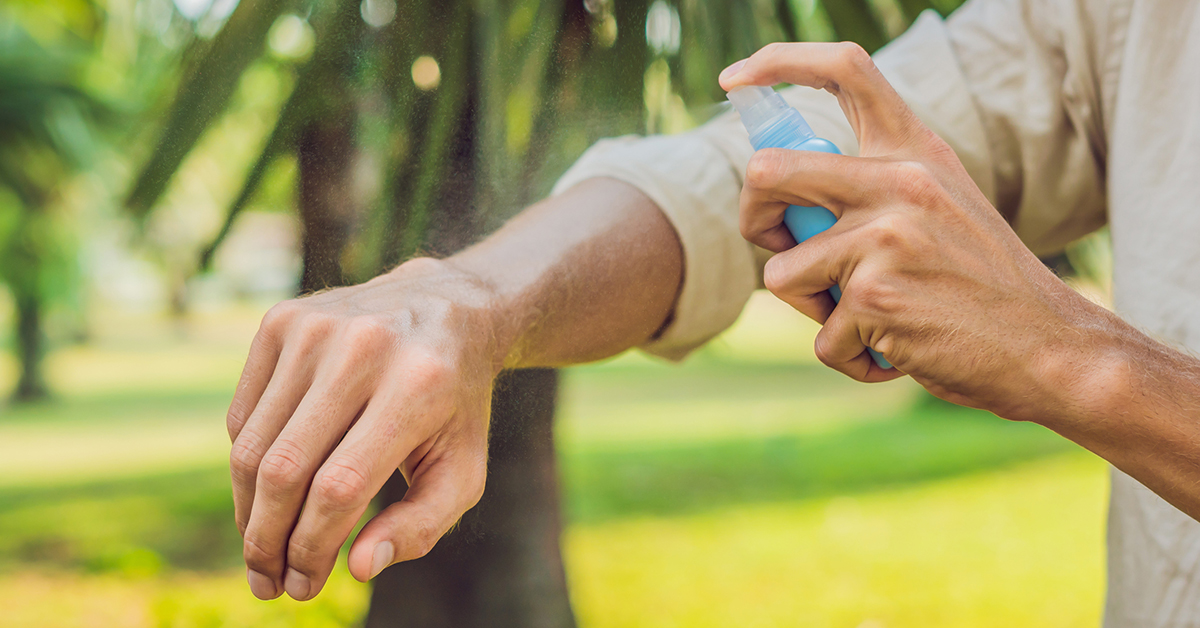
To Use or Not To Use? What to Know About Bug Spray, Sunscreen, and Cancer
-
Insect repellents and sunscreen can help you steer clear of harmful bug bites and sunburns. But can their ingredients increase the risk for cancer? With the arrival of warmer weather, here’s what you should know about these products—and whether the benefits outweigh the risks.
Sunscreen and cancer risk
Different sunscreens use different types of ingredients to block the sun’s harmful rays.
- Mineral sunscreens work by deflecting the sun’s rays. They contain active ingredients like zinc oxide or titanium dioxide, which are generally recognized as safe by the U.S. Food and Drug Administration (FDA).
- Chemical sunscreens work by absorbing the sun’s rays. They contain active ingredients like ozybenzone, avobenzone, octisalate, octocrylene, homosalate, and octinoxate.
Some studies have shown that oxybenzone may interfere with how hormones work. More recently, the Center for Drug Evaluation and Research, an arm of the FDA, published a pilot study that investigated the effect avobenzone, oxybenzone, and octocrylene on the body.
The conclusion of that study resulted in the FDA asking for more research on chemical sunscreen ingredients.
But the agency hasn’t concluded that the ingredients are unsafe or that people shouldn’t use sunscreens that contain these ingredients. Rather, the FDA is suggesting manufacturers perform additional studies to see if chemical absorption of these ingredients poses health risks.
So what should you do?
Applying a broad-spectrum sunscreen with an SPF of 30 or higher remains one of the best things you can do to help protect against skin cancer, according to the American Academy of Dermatology.
“The benefits of not burning your skin far outweigh the risks of sunscreens,” said Jeffrey Farma, MD, FACS, a surgical oncologist and skin cancer expert at Fox Chase Cancer Center.
If you’re concerned about the ingredients in chemical sunscreens, experts recommend using a mineral sunscreen instead.
The bottom line: Regular sunscreen use will definitely reduce your risk for skin cancer. More studies are needed to determine if ingredients used in certain chemicals sunscreens pose additional health risks.
Bug sprays and cancer risk
Unlike sunscreen, there aren’t any official recommendations for applying insect repellents. But experts agree that using them while spending time in bug-prone areas is an effective way to prevent bug bites that could transmit diseases like West Nile virus.
When you need to use an insect repellent, the Centers for Disease Control and Prevention recommends using an EPA-registered product. These contain ingredients that have been evaluated and approved for human safety and effectiveness, including picaridin, IR3535, oil of lemon eucalyptus (OLE), para-menthane-diol (PMD), 2-undecanone, and DEET.
Despite what you may have heard about DEET, there’s no evidence that DEET causes cancer in humans or animals. In fact, nearly all the DEET absorbed by your skin is eliminated by urination within 24 hours. And it’s considered the most effective defense against biting insects.
Regardless of the product you choose, it’s important to use insect repellents correctly.
- Always follow product label instructions.
- Apply it over, not under, sunscreen.
- Don’t spray repellent on skin covered by clothing.
It’s important to only spray bug repellent containing DEET on top of your clothes, and not on areas of your body with skin exposed, like your hands, neck and face. Although absorbing a small amount of DEET when applying the spray to your clothes is safe, you still need to try to minimize your skin’s exposure to DEET as much as possible. Absorbing too much DEET can result in skin irritation.
When applying the spray, it’s also important to avoid using repellents or other skin products that contain alcohol, which can boost the skin’s absorption of DEET.
The bottom line: EPA-registered insect repellents, including those containing DEET, are safe and effective. It’s worth using one in situations where you may be exposed to ticks or mosquitos since their bites can transmit diseases.
